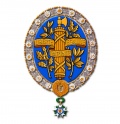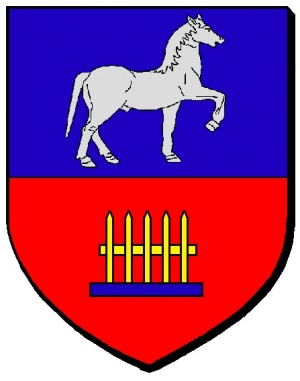La Clayette: Difference between revisions
Knorrepoes (talk | contribs) No edit summary |
Knorrepoes (talk | contribs) m (Text replacement - " " to " ") |
||
| Line 11: | Line 11: | ||
===Origin/meaning=== | ===Origin/meaning=== | ||
The white horse refers to that of King Henri IV which he bought (was bought for him) at the fair of La Clayette. The horse was from the stables at La Pouge in the village of St Symphorien-des-Bois just outside of La Clayette. | The white horse refers to that of King Henri IV which he bought (was bought for him) at the fair of La Clayette. The horse was from the stables at La Pouge in the village of St Symphorien-des-Bois just outside of La Clayette. | ||
Henri rode the white horse to victory in the battle of Ivry in 14 March 1590. Since then the horse has been the symbol of La Clayette. There is also a large statue of a horse on the bank of the lake in front of the Chateau of La Clayette. | Henri rode the white horse to victory in the battle of Ivry in 14 March 1590. Since then the horse has been the symbol of La Clayette. There is also a large statue of a horse on the bank of the lake in front of the Chateau of La Clayette. | ||
Revision as of 15:15, 19 August 2021
French heraldry portal
This page is part of the French heraldry portal |
Heraldry of the World |
|
French heraldry:
Overseas territories:
|
Selected collector's items from France:
|
LA CLAYETTE
Département : Saône-et-Loire
Official blason
- (fr) Coupé: au 1er d'azur au cheval passant et contourné d'argent, au 2e de gueules à la barrière palissadée d'or sur une terrasse isolée et cousue d'azur.
Origin/meaning
The white horse refers to that of King Henri IV which he bought (was bought for him) at the fair of La Clayette. The horse was from the stables at La Pouge in the village of St Symphorien-des-Bois just outside of La Clayette. Henri rode the white horse to victory in the battle of Ivry in 14 March 1590. Since then the horse has been the symbol of La Clayette. There is also a large statue of a horse on the bank of the lake in front of the Chateau of La Clayette.
The base is canting, the name is derived from La Claie, meaning either a gate/barrier to control the level of water or a rack onto which criminals were tied, or more in general a fence.
Contact and Support
Partners:
Your logo here ?
Contact us
© since 1995, Heraldry of the World, Ralf Hartemink 
Index of the site
Literature : Image from http://www.armorialdefrance.fr; background from Lyn Steven












